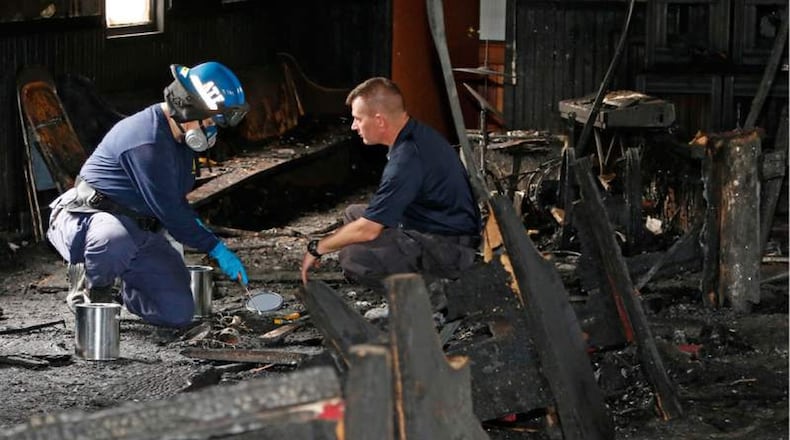“I imagine one of the reasons people cling to their hates so stubbornly is because they sense, once hate is gone, they will be forced to deal with pain.” — James Baldwin, “The Fire Next Time”
That quote from my all-time favorite author tops today’s edition of This Life because I can’t for the life of me imagine another reason why anyone in their right mind would torch a place of worship.
If you've been paying attention to the news at all of late, you know that somebody set fire last week to Hopewell Missionary Baptist Church in Greenville, Miss.
The church’s beige brick walls still stand, but the pulpit and pews were burned black, and soot stains the brick above and next to some windows. Greenville Fire Chief Ruben Brown Sr. said the structure was “80 percent destroyed.”
How sad.
The FBI has opened a civil rights investigation of the fire, and an $11,000 reward is being offered for information leading to the conviction of whoever set the blaze.
Still, it’s hard for me to believe that even with all our problems that churches are more likely to be set afire than the houses we inhabit, particularly in Southern states like Mississippi, where church arson was common during the civil rights movement, with sometimes devastating consequences.
Who can forget the four young girls killed in 1963 at the 16th Street Baptist Church in Birmingham, Ala., after members of the Ku Klux Klan planted dynamite beneath the front steps of the church?
That was more than 50 years ago — five decades — and yet according to a Pew Research Center analysis of data from the Bureau of Alcohol, Tobacco, Firearms and Explosives, about half of all the fires at houses of worship in the past 20 years were intentionally set. Of the 4,705 reported fire incidents at houses of worship between 1996 and 2015, 2,378, or 51 percent, had been ruled intentional as of July 2015.
I don’t know what set arsonists off between 1995 and 1996, but more than 30 black churches were torched in an 18-month period.
Two years earlier, in 1993 on the 25th anniversary of the assassination of the Rev. Martin Luther King Jr., my childhood church, Springhill Free Will Baptist, was one of two black churches set afire by three white teenagers.
Just as there was an outpouring of benevolence from blacks and whites to rebuild Hopewell in Greenville, black and white volunteers came together to rebuild both, more proof that God can turn even what was meant for evil into something good.
As Rex Cowart, a white mail carrier from nearby Summit and one of more than a dozen volunteers who showed up to work on the new Springhill sanctuary, was quoted as saying: “God took a tragedy and made a miracle out of it.”
I will never forget the news reports that described the teens kicking in the door, taking hymnals and baskets of artificial flowers to start the fire, then yelling racial slurs before driving 12 miles to Rocky Point Missionary Baptist and setting it afire.
Church burnings had long been the signature crime of white resistance in southwest Mississippi where I grew up. Somewhere between 200 and 300 places of worship were torched in the ‘60s alone.
There was no place more terrifying to be. Attacks on African-Americans, their homes, their businesses and churches were almost a daily occurrence.
Two of the youths who torched Springhill and Rocky Point would eventually be given mandatory prison sentences of three years and one month, and the other, who had a previous conviction for a gun offense, was sentenced to three years and 10 months. They were also ordered by the court to pay $138,000 in restitution.
The increase in church burnings in the South led Congress to pass the Church Arson Prevention Act in 1996. The measure increased the sentence for arson at a house of worship to a maximum of 20 years.
You’d think that would’ve been enough to put an end to such arsons once and for all.
I know that the turning of a calendar year doesn’t necessarily mean we’ve moved on and somehow gotten past our racial history.
But I do hope we’ll finally deal with the pain and do what we’re called to do. Love thy neighbor as thyself.
About the Author
Keep Reading
The Latest
Featured



